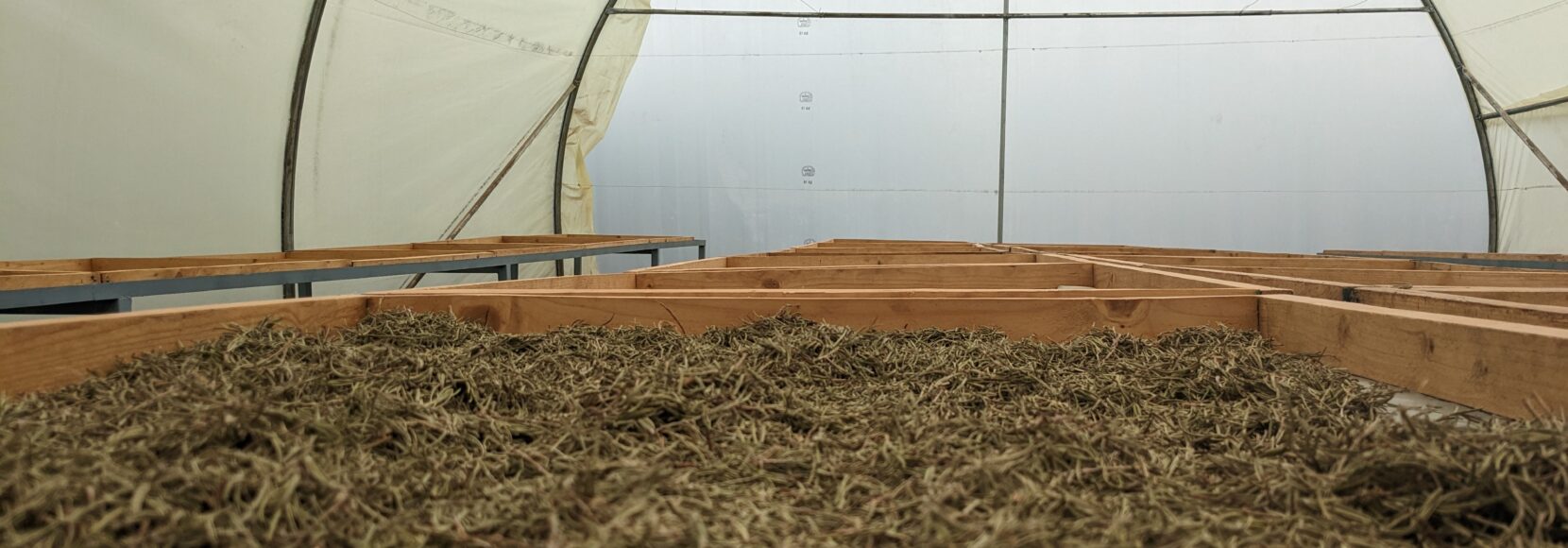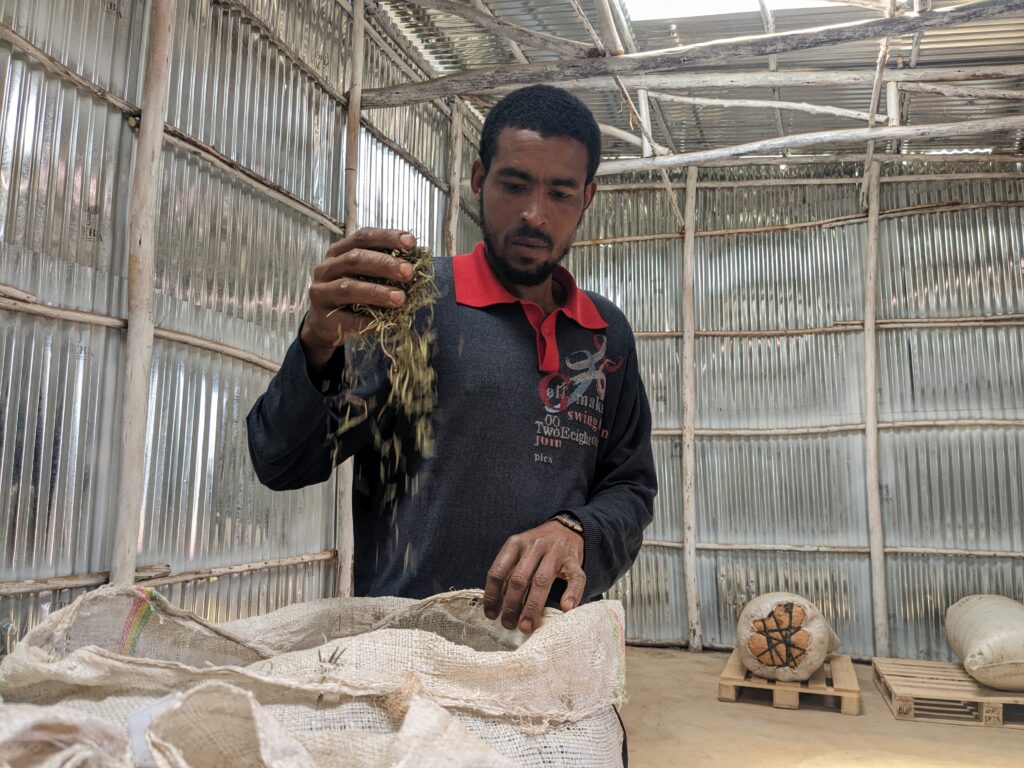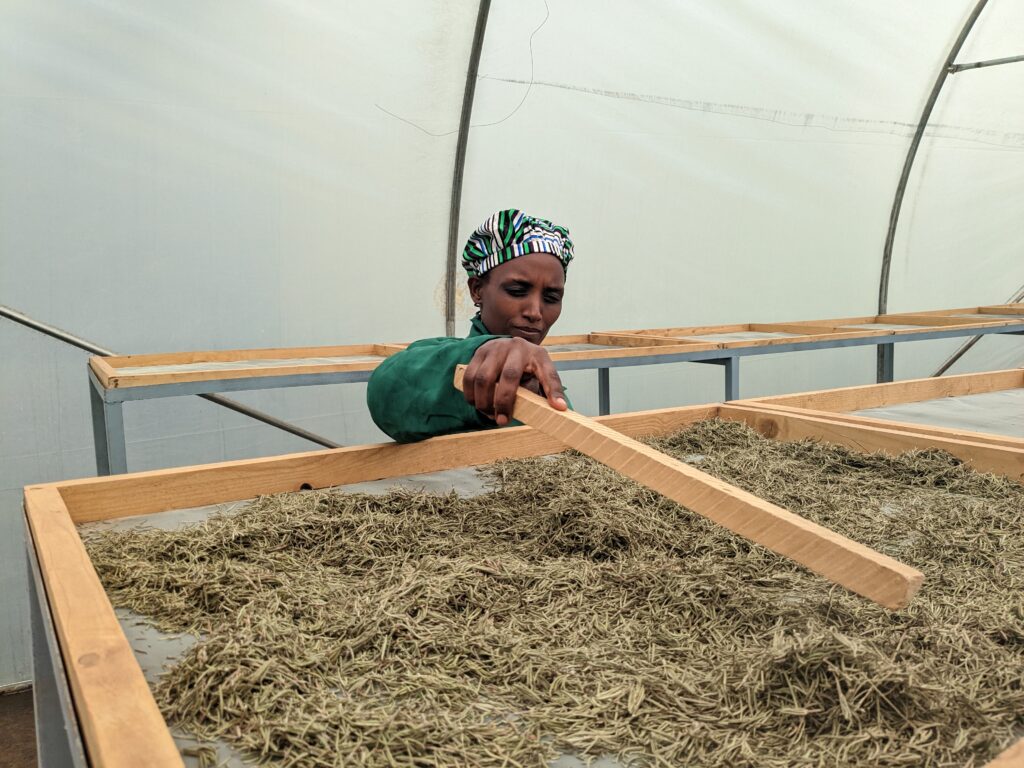
The Economic Impact of Sustainable Agriculture and Strong Markets in Ethiopia
For farmer Kadri Mohamed, a more sustainable and inclusive agricultural market transformed his livelihood and his family’s quality of life.
The wait used to be frustrating for Kadri Mohamed. The young farmer from central Ethiopia would sell his rosemary crop to local traders, but sometimes, it would be three weeks before he’d see any money. Often, the payment he received was less than he had expected. The delays and lack of clarity made supporting his wife and two children difficult.
That was just one disadvantage Kadri faced when selling his crop informally to local traders. These buyers also provided no training on growing his crop sustainably or harvesting it so it wouldn’t go to waste. “We didn’t care about threshing too hard and breaking the rosemary,” he recalled.
Sometimes the damaged rosemary would be rejected and would find no market, joining the more than 1 billion tons of food that goes to waste globally each year.

The Economic Impact of Sustainable Agriculture
The challenges Kadri faced are familiar to many of the world’s 500 million smallholders. Informal local markets frequently fail to provide farmers with the predictable and timely pay, investment, and training they need to improve their farms and lift their families out of poverty.
Helping farmers supply formal value chains enables them to earn better, more stable prices for their crops and adopt more sustainable production practices, contributing to economic development in rural communities and securing jobs.
Scaling Ethiopia’s Regenerative Export Sector with Outgrowers (SERES): Implementing Sustainable Practices in Ethiopian Farming
To seize this opportunity, TechnoServe and the Norwegian Agency for Development Cooperation (NORAD) launched the Scaling Ethiopia’s Regenerative Export Sector with Outgrowers (SERES) project in 2021.
The vision of the project, which concluded in June 2024, was to work with the private sector to establish more formal, transparent value chains connecting smallholder farmers to consumers around the world. The project also promoted the production and consumption of sustainably grown fruits and herbs.
Partnering to Scale Sustainable Rosemary Farming
As part of the SERES project, TechnoServe partnered with GENA, an Ethiopian agribusiness that exports a wide range of agricultural products. The company wanted to export rosemary to lucrative markets overseas, but to do that, it would need to establish a direct link to small-scale rosemary growers. Such a connection would ensure the company could consistently acquire crops that meet international standards.
Through SERES, GENA received a grant to establish a rosemary collection center and drying facility, land donated by the local woreda (district) government, and technical advice from TechnoServe focused on effectively sourcing from smallholders. GENA offered farmers a guaranteed price and quick payment, and it also delivered training on sustainable farming practices, business skills, food safety, and quality assurance.

In October 2023, the company opened its drying facility, where it dries the rosemary produced by some of its suppliers and demonstrates good drying practices for the farmers who dry their own crop at home. All told, more than 100 farmers sell rosemary to GENA, attracted by the company’s convenience, price, and services.
How $160 Transformed a Family’s Security
For Kadri, the change has been dramatic. The price GENA pays is eight times as much as what the informal traders sometimes offer, and the payments are made via direct deposit to his account within just a few days. Kadri particularly valued the training on how to thresh and pack his rosemary to avoid defects and having the crop rejected. “Now we know that we can’t break the leaves into two or three pieces,” he said.
The stronger market also changed Kadri’s behavior. “I was inspired to work more on the farm…I had more confidence in the sector,” he explained. He planted rosemary on an additional 0.25 hectares of his farm and rented half a hectare from a neighbor to grow more.
As a result, Kadri’s annual income from rosemary has increased from $190 to $350. “When I sell, I can purchase clothes and shoes for my children,” he said. “They are so happy, and they call me ‘Baba’ [father]. That makes me so proud.” His children eat better now, and he plans to save money to pay for their education.
The increased income is also making his family safer. Before his earnings from rosemary increased, the family home did not have a door that could be locked. With his extra income, he was able to install a lockable door. For the first time, he can keep assets safely at home, and he worries less about his children’s safety.
Kadri is optimistic: with GENA growing in his community, he sees a strong future in rosemary. He hopes to continue growing his parcel and one day buy a car. With improved market access and a partner in sustainable production, he has reason to dream big.






